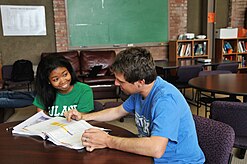Types of Education
– Formal education takes place in institutions like public schools.
– Non-formal education is structured but occurs outside the formal schooling system.
– Informal education is unstructured and happens through daily experiences.
– Education can be classified by levels, such as early childhood, primary, secondary, and tertiary education.
– Different subjects can also be a focus of education, like science, language, and physical education.
– Tutoring is an example of non-formal education.
– Learning how to cook from parents belongs to informal education.
– Formal education is compulsory and guided by the government.
– Non-formal education is organized, systematic, and has a clear purpose.
– Informal education happens in a spontaneous way through daily experiences.
– Informal education takes place in different settings and situations throughout life.
– It includes learning a first language from parents.
– Learning how to prepare a dish by cooking together is an example of informal education.
– Informal education occurs in places of everyday routines.
– It is often driven by intrinsic motivation.
– The International Standard Classification of Education distinguishes levels based on age, duration, and complexity.
– Early childhood education (level 0) focuses on holistic development and prepares children for primary education.
– Primary education (level 1) teaches basic skills in reading, writing, mathematics, and fosters personal development.
– Secondary education (levels 2-3) extends and deepens learning outcomes, often includes vocational training.
– Tertiary education (levels 5-8) provides specialized knowledge and leads to academic degrees.
– Tertiary education expands upon secondary education and has a narrow focus on a specific field or subject.
– It can be divided into short-cycle tertiary, Bachelors, Masters, and doctoral level education.
– Short-cycle tertiary education focuses on practical matters and prepares students for specialized professions.
– Bachelors level education is longer and more in-depth than short-cycle tertiary education.
– Tertiary education leads to academic degrees and often requires completion of previous levels.
– Traditional education: teacher-centered, well-regulated school environment
– Alternative education: differs from traditional approach, different learning environment, personalized instruction
– Homeschooling: form of alternative education
– Charter schools: type of alternative education
– Special education: adapted to meet unique needs of students with disabilities
– Indigenous education: focuses on transmission of knowledge from indigenous heritage
– Gurukul schools in India: form of alternative education
– Madrasa schools in the Middle East: form of alternative education
– Yeshivas in Jewish tradition: form of alternative education
– Categories based on age: childhood education, adolescent education, adult education, elderly education
– Teacher-centered education: teacher provides information
– Student-centered education: students take active role in shaping classroom activities
– Conscious education: learning and teaching with clear purpose
– Unconscious education: learning without conscious planning or guidance
– Evidence-based education: uses scientific studies to determine effective methods
– Autodidacticism: self-directed learning without guidance
– Lifelong education: ongoing learning throughout a person’s life
– Lack of structure and guidance in autodidacticism can lead to aimless learning
– Autodidacticism mainly occurs in adult education
– Lifelong education promotes continuous personal growth and development
– Science education: focuses on teaching science subjects
– Language education: focuses on teaching language skills
– Art education: focuses on teaching artistic skills
– Religious education: focuses on teaching religious beliefs and practices
– Physical education: focuses on teaching physical fitness and sports skills
– Distance education: uses special mediums like radio or websites
– Examples of distance education: e-learning, m-learning, online education
– Open education: courses and materials made available with minimal barriers
– State education: funded and controlled by government, available to general public
– Private education: funded and managed by private institutions, often selective admission process
Definitions of Education
– Education is a purposeful activity aimed at transmitting knowledge, skills, and character traits.
– There is ongoing debate about the exact nature of education beyond these general features.
– Some view education as a process that occurs during schooling, teaching, and learning.
– Education can also refer to the mental states and dispositions of educated individuals.
– The term education can also refer to the academic field studying teaching and learning.
Factors Affecting Education
– Psychological factors like motivation, intelligence, and personality influence educational outcomes.
– Social factors such as socioeconomic status, ethnicity, and gender can impact access to education.
– Access to educational technology, teacher quality, and parent involvement are additional factors.
– Discrimination can also be a barrier to educational success.
– Various factors interact to determine whether education is successful.
History of Education
– In prehistory, education was informal and occurred through oral communication and imitation.
– With the rise of ancient civilizations, writing was invented, leading to a shift from informal to formal education.
– Initially, formal education was mainly available to elites and religious groups.
– The invention of the printing press in the 15th century increased general literacy.
– Public education became more important in the 18th and 19th centuries, leading to the worldwide process of making primary education available to all.
Aims of Education
– Education socializes children into society by teaching cultural values and norms.
– It equips individuals with the skills needed to become productive members of society.
– Education stimulates economic growth and raises awareness of local and global problems.
– Different theories propose various aims of education, such as socialization and personal well-being.
– Critical thinking is often emphasized as a distinguishing factor between education and indoctrination. Source: https://en.wikipedia.org/wiki/Education
Education is the transmission of knowledge, skills, and character traits and comes in many forms. Formal education happens in a complex institutional framework, like public schools. Non-formal education is also structured but takes place outside the formal schooling system, while informal education is unstructured learning through daily experiences. Formal and non-formal education are divided into levels that include early childhood education, primary education, secondary education, and tertiary education. Other classifications focus on the teaching method, like teacher-centered and student-centered education, and on the subject, like science education, language education, and physical education. The term "education" can also refer to the mental states and qualities of educated people and the academic field studying educational phenomena.
The precise definition of education is disputed, and there are disagreements about what the aims of education are and to what extent education is different from indoctrination by fostering critical thinking. These disagreements affect how to identify, measure, and improve forms of education. Fundamentally, education socializes children into society by teaching cultural values and norms. It equips them with the skills needed to become productive members of society. This way, it stimulates economic growth and raises awareness of local and global problems. Organized institutions affect many aspects of education. For example, governments set education policies to determine when school classes happen, what is taught, and who can or must attend. International organizations, like UNESCO, have been influential in promoting primary education for all children.
Many factors influence whether education is successful. Psychological factors include motivation, intelligence, and personality. Social factors, like socioeconomic status, ethnicity, and gender, are often linked to discrimination. Further factors include access to educational technology, teacher quality, and parent involvement.
The main academic field investigating education is called education studies. It examines what education is, what aims and effects it has, and how to improve it. Education studies has many subfields, like philosophy, psychology, sociology, and economics of education. It also discusses comparative education, pedagogy, and the history of education. In prehistory, education happened informally through oral communication and imitation. With the rise of ancient civilizations, writing was invented, and the amount of knowledge grew. This caused a shift from informal to formal education. Initially, formal education was mainly available to elites and religious groups. The invention of the printing press in the 15th century made books more widely available. This increased general literacy. Beginning in the 18th and 19th centuries, public education became more important. This development led to the worldwide process of making primary education available to all, free of charge, and compulsory up to a certain age.




